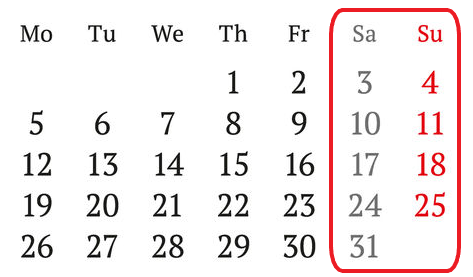Why Is Forex Closed on Weekends?
Even though in theory the currency market never closes, it is extremely hard to see someone trading on a Sunday. A beginner may even feel the trading activity has come to a halt because of Forex brokers who take a break on weekends. However, it is not the case as explained below.

Major participants in the Forex market
In one of our earlier guides (Who Trades Forex?) we had mentioned that currency trading is primarily done to facilitate trade and travel. Further, we had also stated that institutional investors contribute 93% of the total trading volume. This means that of the $7,5 trillion worth transactions carried out in the foreign exchange market, retail traders represent only about $500 billion worth of transactions. It is one of the main reasons for the currency market to remain closed during the weekends.
Why Forex brokers discourage trading on weekends
Barring Middle East, across the globe, almost all the financial institutions remain closed during the weekends. At least, trading desks of most banks will not function. This means that $4.7 trillion worth of liquidity will be non-existent on the weekends. So, if a retail broker still allows trading to happen through its platform, then it could likely face two issues. Firstly, a broker acting as a market maker will have no options to hedge the risk as the major counter-parties (banks and other financial institutions) are away from the trading desk. Secondly, the broker cannot offer tight spreads due to lack of liquidity. The spread of a currency pair is inversely proportional to its liquidity (the spread decreases when major players try to outbid each other to get their trades executed).
So, to compensate for the loss of liquidity, reduce risk, and act as a counter-party to a trade, a Forex broker should increase the spread considerably (a spread of 20 pips was normal when OANDA was offering weekend trading before disabling the feature). An increase in spread would discourage retail traders from entering a trade. Further, an FX broker needs to employ some people to monitor the situation during the weekends. Additionally, to keep the systems working during weekends, a broker will incur additional infrastructure related costs (power, uplink, and so on). Ultimately, the company may not have much to gain by offering weekend trading. Additionally, if the market opens with a large gap on the subsequent day, then it may result in a huge loss to the broker. Since the reward is rarely worth the risk, retail brokers choose not to offer weekend trading.
Is there a way to trade on weekends?
Theoretically, a high net worth individual with a big trading account can negotiate with a Forex broker to place trades on weekends. However, considering the liquidity and spread aspects, it is hardly a prudent way to trade.
Weekend closure also allows Forex brokers to conduct weekend maintenance of the systems (e.g., InstaForex traders may have the experience of seeing the loss of connectivity for about two hours after midnight GMT time on Saturday). Professional traders, who can gauge the trend of a currency pair with reasonable accuracy, will not have any need to place an order during the weekend. They would rather do it on Monday (GMT) when the next session opens. In case of beginners, it would be better to have a rest, assess performance, fine tune the strategy and come back fresh when the market opens on Monday.
If you want to get news of the most recent updates to our guides or anything else related to Forex trading, you can subscribe to our monthly newsletter.